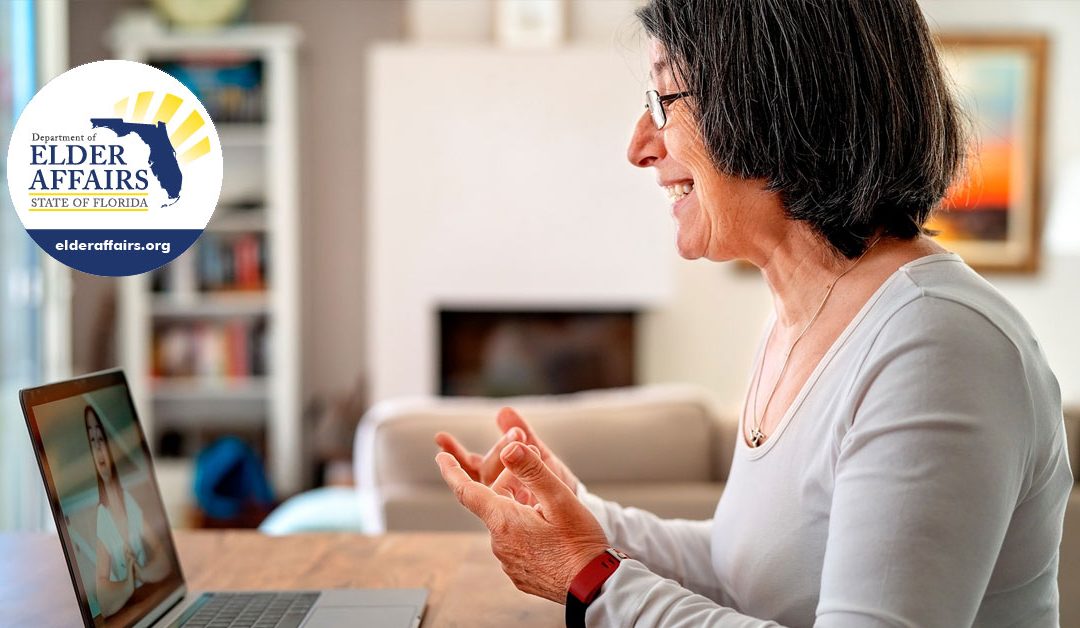FROM TALLAHASSEE TO YOU
Florida Department of Elder Affairs
Message from Secretary Richard Prudom
 Floridians have navigated an ever-changing road map this year. From visiting with family and friends and enjoying social interactions, to looking forward to travel and volunteering in the community, most aspects of everyday living have changed to one degree or another.
Floridians have navigated an ever-changing road map this year. From visiting with family and friends and enjoying social interactions, to looking forward to travel and volunteering in the community, most aspects of everyday living have changed to one degree or another.
The Year in Review
Many people over 65 years of age had to make additional adjustments because COVID-19 disproportionately affected the aging population; however, Floridians are strong, resourceful, and resilient. Most adults continue to live their lives safely and independently while considering the necessary precautions to protect themselves and others.
The Florida Department of Elder Affairs (DOEA) also changed in the early months of this year. DOEA took immediate actions to ensure basic needs for older adults were met. DOEA in affiliation with Florida’s Aging Network—that’s the Area Agencies on Aging and their local organizations throughout the state—mobilized in order to increase the number of home-delivered meals. In fact, home-delivered meals increased by over 200 percent compared
to the same time last year. And DOEA delivered over 13 million meals during a seven-month period. Ingenuity among local providers allowed a new partnership with the Florida Restaurant and Lodging Association to be self-sustaining, and the program may continue to bring home-delivered meals to seniors staying safer at home into the future.
As DOEA adapted, and local resource centers stabilized by meeting the basic needs of residents including meals, shopping assistance, delivery services, and staffing new volunteers, the Aging Network turned its attention to the social and emotional needs of veterans, caregivers, people with disabilities, and all older adults. The challenge to mitigate the negative impacts of loneliness and reduce social isolation was to find delivery methods and venues consistent with social distancing guidelines.
If someone is living with loneliness or depression, picking up the telephone and asking for help may seem like a heavy lift, but assistance is available and phone calls can become a beacon for connection. DOEA worked with the Aging Network and the Aging and Disability Resource Centers to step up telephone reassurance calls and averaged more than 50,000 calls a month through both responsive and proactive calls to check on the unmet needs, well-being, and safety of older residents. Additionally, DOEA created mental health messaging through the Talk It Out campaign and placed flyers in the bags of home-delivered meals. Social networking reiterated the fact that depression is not a normal part of growing older and listed numerous resources at #TalkItOutFl. Most recently, over 32 Talk It Out billboards have gone up throughout the state.
Another solution to breaking social isolation may be found on the DOEA homepage website through our therapeutic robotic companion pets initiative. DOEA partnered with Ageless Innovation’s Joy for All Companion Pets to enhance meaningful interactions among older adults, their caregivers, and family members. DOEA began delivering therapeutic robotic pets to socially isolated seniors and adults living with Alzheimer’s disease and related dementias in April of 2020. The interactive companion pets help combat loneliness or depression by improving overall mood and quality of life. Anyone wishing to receive a robotic pet may fill out the online application. DOEA has distributed over 4,000 pets within a six-month period.
Two other initiatives are worth mentioning when it comes to adaptability and flexibility of programs during
this unprecedented time. DOEA launched the Florida SAFE Survey in August and over 12,000 individuals have visited www.FloridaSAFESurvey.com. By taking the survey, respondents discover how their behaviors affect their own health and the health of those around them. The survey is free and may be taken multiple times so a person can see how different actions may impact their risk factors and SAFE behavior scores. The survey itself is adaptable to changing situations, and the most recent additions to the survey include questions on how an individual will spend the holidays.
The final program is a perfect fit for December, as the theme is Together Apart: Holidays at Heart. This program refocuses the Talk It Out mental health campaign and specifically addresses loneliness seniors may experience during the holidays. The state’s 11 Area Agencies on Aging will draw attention to the many behavioral health resources in their geographic areas and reach out to people through additional telephone reassurance calls. References, resources, and a press kit for the campaign are available at www.holidaysatheart. org. If you or someone you know is lonely or living with depression, please utilize these valuable resources.
As we all experience the many changes in our communities, I hope you are able to find meaningful connections this holiday season. I truly wish you the best of holidays and a joyous new year.


Recent Comments